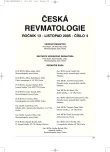-
Medical journals
- Career
Experience with leflunomide (ARAVA) treatment of active rheumatoid arthritis at clinical practice in the Czech Republic
Authors: K. Pavelka; L. Šedová
Authors‘ workplace: Revmatologický ústav, Praha
Published in: Čes. Revmatol., 13, 2005, No. 4, p. 127-133.
Category: Original Papers
Overview
Leflunomide (ARAVA®) is a newer disease modifying drug for the treatment of rheumatoid arthritis. Inhibition of pyrimidine synthesis with consequent modification of activated T-cell function is postulated to be a mechanism of the drug effect. Leflunomide significantly decreases clinical activity of RA, even in the long-term; favorably influences functional status and slows x-ray progression of RA patients. The authors discuss here the results of postmarketing, open study performed in the Czech Republic that comprised 999 patients. Mean duration of the treatment was 10.5 ± 5.8 months (0-41). Beneficial therapeutical response was achieved in 68.3 % patients after 6 months (decrease of DAS28 > 1.2). Significant reduction of swollen and tender joints as well as CRP (p < 0.001) was also observed. The treatment was well tolerated, serious adverse events (without permanent consequences) occurred within 2 % of patients. Serious hepatotoxicity was not detected. Seventy-nine patients still remain on leflunomide after 10 months of treatment. Number of patients who returned to work increased from 22 % to 39 %. Good risk/benefit ratio of leflunomide and probably also good pharmacoeconomic parameters of the treatment are demonstrated in this study.
Key words:
rheumatoid arthritis, leflunomide, DMARDs
Labels
Dermatology & STDs Paediatric rheumatology Rheumatology
Article was published inCzech Rheumatology

2005 Issue 4-
All articles in this issue
- Experience with leflunomide (ARAVA) treatment of active rheumatoid arthritis at clinical practice in the Czech Republic
- Selenium concentration and the activity of glutathione peroxidase in sera of patients with rheumatoid arthritis
- Is it really an inflammatory myopathy? Value of immunohistochemistry of muscle tissue in the differential diagnosis of myositis
- Viral arthritides
- RS3PE syndrom (Remitting seronegative symmetrical synovitis with pitting edema)
- Antibodies against citrullinated proteins in rheumatoid arthritis
- Polyarthritis in a patient with common variable immunodeficiency: a case report
- Czech Rheumatology
- Journal archive
- Current issue
- Online only
- About the journal
Most read in this issue- Antibodies against citrullinated proteins in rheumatoid arthritis
- Experience with leflunomide (ARAVA) treatment of active rheumatoid arthritis at clinical practice in the Czech Republic
- Viral arthritides
- RS3PE syndrom (Remitting seronegative symmetrical synovitis with pitting edema)
Login#ADS_BOTTOM_SCRIPTS#Forgotten passwordEnter the email address that you registered with. We will send you instructions on how to set a new password.
- Career

